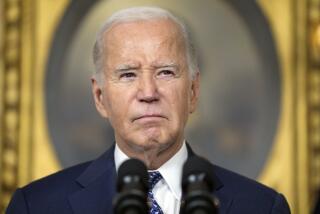Making an Iraq-Al Qaeda Link
- Share via
In an Oct. 7, 2002, letter to the Senate Intelligence Committee, CIA Director George Tenet wrote that his agency had “solid reporting of senior-level contacts between Iraq and Al Qaeda going back a decade.”
According to Tenet, the CIA had “credible information” about discussions between Iraq and Al Qaeda on “safe haven and reciprocal nonaggression,” as well as “solid evidence of the presence in Iraq of Al Qaeda members” and “credible reporting” that “Iraq has provided training to Al Qaeda members in the areas of poisons and gases and making conventional bombs.”
But critics of the Bush administration were blithely dismissive of these charges in advance of the war. Cooperation between Saddam Hussein and Osama bin Laden was inconceivable, they argued, because Hussein was a secularist and Bin Laden a radical Islamist. Bin Laden, after all, had publicly called Hussein an “infidel.”
Since the end of the war, these critics have become even more emboldened, complaining with increasing volume and self-righteousness about alleged prewar “deception” on the relationship between Hussein and Bin Laden.
“Clearly the Al Qaeda connection was hyped and exaggerated, in my view,” California Sen. Dianne Feinstein said this fall.
“The president told everybody that Al Qaeda was in Iraq and they were in cahoots,” Democratic presidential candidate Howard Dean said. “That was not true.”
Other Democrats joined in what quickly became a chorus of conventional wisdom. Al Gore, in an acidic speech in New York, accused the Bush administration of “deception,” adding that “the evidence now shows clearly that Saddam Hussein did not want to work with Osama bin Laden at all, much less give him weapons of mass destruction.”
What “evidence” was it, exactly, that led Gore to this conclusion? Nobody knows. He didn’t say.
But it now appears that he and his fellow Democrats were wrong. A new document, prepared by Douglas J. Feith, undersecretary of Defense for policy, contains 50 points on intelligence reporting on the relationship between Hussein and Bin Laden.
Feith sent the 16-page report to the Senate Intelligence Committee on Oct. 27, 2003.
Whatever Gore’s “evidence” was, it’s a safe bet that this CIA reporting, from a “well-placed” source and included in Feith’s memo, wasn’t part of it: “Bin Laden was receiving training on bomb making from the [Iraqi Intelligence Service’s] principal technical expert on making sophisticated explosives, Brigadier Salim al-Ahmed. Brigadier Salim was observed at Bin Laden’s farm in Khartoum [Sudan] in Sept.-Oct. 1995 and again in July 1996.”
Nor do the Democrats appear to have taken into account this piece of information from a U.S. interview with Farouk Hijazi, former deputy director of Iraqi intelligence: “He said that in a 1994 meeting with Bin Laden in the Sudan, Bin Laden had requested that Iraq assist Al Qaeda with the procurement of an unspecified number of Chinese-manufactured anti-ship limpet mines ... Bin Laden also requested the establishment of Al Qaeda training camps inside Iraq.”
According to other reporting in the Feith document, Bin Laden eventually got at least some of those training camps. What happened there? “An Iraqi intelligence officer said that as of mid-March, the IIS was providing weapons to Al Qaeda members located at a training camp in northern Iraq, including rocket-propelled grenade (RPG-18) launchers.”
Other information in the document points to a secret operational relationship between Bin Laden and the Iraqi leader that goes well beyond mere “contacts” or “links” or “connections.” According to one entry, a “sensitive source” reported that “Iraq’s contacts intensified after Al Qaeda’s successful attacks against the U.S. embassies in Africa in August 1998.”
If their recent statements are any indication, Democrats and other critics of the administration are clinging to the conventional wisdom, discredited though it may be.
At a presidential debate Monday, several of the Democratic candidates again accused the Bush administration of misleading the country to go to war. Jesse Jackson, after the debate, flatly declared that there were no connections between Al Qaeda and Iraq.
Evidence to the contrary is mounting. Serious questions remain about the existence of Hussein’s stockpiles of weapons of mass destruction and the Bush administration’s postwar planning. Democrats do themselves and the country a disservice by ignoring the relationship between Hussein and Bin Laden, two of America’s most dangerous and determined enemies.
More to Read
Get the L.A. Times Politics newsletter
Deeply reported insights into legislation, politics and policy from Sacramento, Washington and beyond. In your inbox twice per week.
You may occasionally receive promotional content from the Los Angeles Times.










